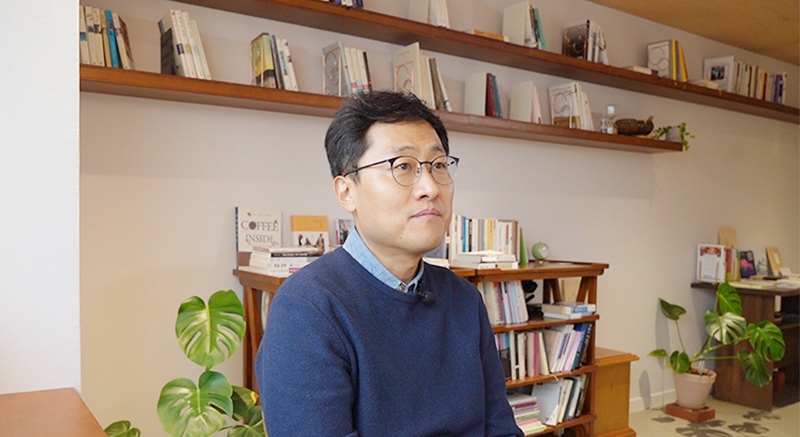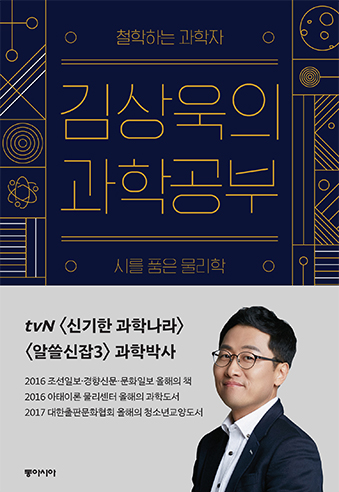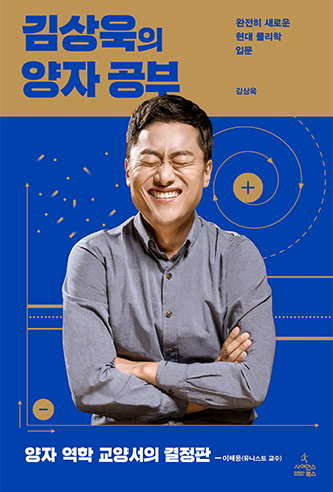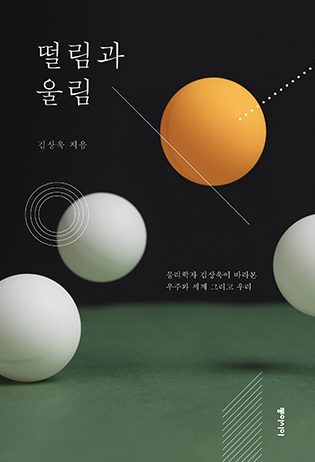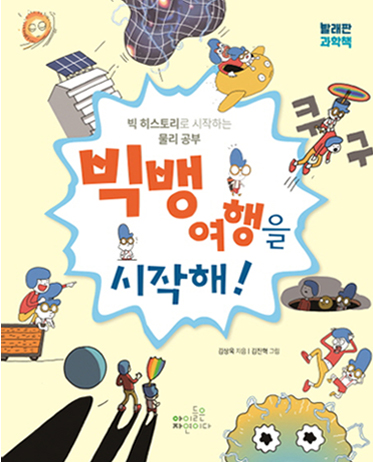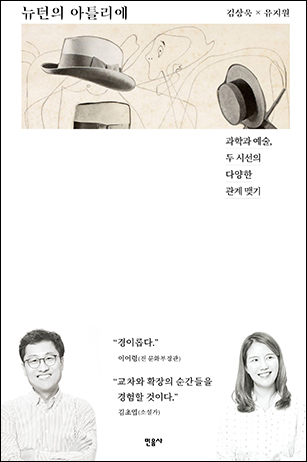|
Korean Authors
Writer Kim Sang-Wook A recommendation for a science book that all can enjoy, while retaining its essence
2022.01.03
Regardless of the sector, it is meaningful to lower the entry barrier to make it more accessible and give a sense of closeness to the general public. Books are great enablers in those efforts. It goes the same for science, which people often find challenging to approach. Let's suppose science is made more accessible and friendly through writings that take different approaches, closing the distance. In that case, people will find it fun to read science books. This is what writer Kim Sang-Wook tried as he broadens the horizon of science books based on his public awareness.
Would you please introduce yourself to the readers?
Hi, I am Kim Sang-Wook, a physicist. It is an honor to get an interview with K-Book Trends. I saw it as an excellent opportunity to let readers in other countries learn about Korean writers.
As a physicist, how did you come to write books, and what changed since you started writing?
The first book I wrote is out of print now. It was a book published in 2013, titled Cinema and Science. I came across an opportunity to serialize science editorials at a newspaper. A year's worth of articles was collected and published as Cinema and Science. I came to be noticed as a writer because more people loved my next book, Kim Sang-Wook's Study of Science (EAST-ASIA), more than the first one. My true career as a writer started when one publisher asked me to write a book on the world from a physicist's viewpoint with a humanistic lens. Writing books is quite different from writing papers, which led me to become more aware as a writer as I got more feedback from my readers. I was able to hear people's opinions on my books. It is important to discover unknown facts through research as a scientist, but sharing the results of studies is equally significant. I learned that writing books helped me share the results of studies, and people seemed to be fond of learning what scientists found. What's more, I turned out to be talented at writing, and I even found the work itself to be meaningful. So, I have been communicating with the public more and more through my books.
What is the most important part of your writings?
I wanted to show people that science is something you need in your life. People often say science is hard to comprehend, but so are philosophy or business management. People read difficult books out of their needs to be cultured, but science is often excluded from the list of books to read. It's not a matter of how easy or hard it is to understand. Science is something one should know. People would try to read science books once they find it necessary. I believe reading science books is similar to playing challenging games. Some things need to be done, even if they are tough. The need to read science books is determined by whether the knowledge is of help to society, not practicality. One may think that science is pointless, but all social issues, such as COVID-19, AI, or fine dust, are connected to science. Even national agendas are deeply linked to science. I try to show how science can contribute to society and its necessity in my writings.
As every part of our lives are connected to science,
Your primary job is not a writer, but you wrote plenty books. Do you have a book you like in particular and why?
Kim Sang-Wook's Study of Quantum Mechanics (Sciencebooks) is my favorite. I became a professor in 2004 and wanted to teach quantum mechanics to the public as a professor. I studied physics because I got interested in quantum mechanics after reading a book on the subject. I wrote books because I wanted to show quantum mechanics is something easy and exciting. I made plans to publish books after I started writing in a monthly science magazine, Donga Science. Before Kim Sang-Wook's Study of Quantum Mechanics, books on quantum mechanics were either about the history of the subject or too complex for non-experts to understand. No books touched the essence of quantum mechanics. I tried to describe quantum mechanics how I would explain verbally. I refined the expressions to make my words clear even to people without basic scientific knowledge. I spent a lot of time and effort writing Kim Sang-Wook's Study of Quantum Mechanics, which I would call my favorite book.
Kim Sang-Wook's Study of Science, Kim Sang-Wook's Study of Quantum Mechanics
You are writing about science, which might be hard for the general public to grasp. What kind of influence do you expect your books to have?
Science is about attitude. Some have a prejudice that science consists of laws and principles. You will find that science has more uncertainties and unclear parts than your expectations. Scientific knowledge is valuable, but it is more important to know that science is a study based on a single methodology. Its attitude is about "making a decision based on physical evidence," unlike many studies in the 17th century. This might not be much of a surprise. Still, people in that era used to find answers from scriptures, religious literature, the Analects of Confucius, words of Mencius, or the Book of Changes. In contrast, scientists sought physical evidence to explain the universe. If a person suggests a piece of solid physical evidence, his/her words will prove right in science.
We heard the news that you are to publish a book in other countries. Please tell us about the book. Feel free to recommend a different book if you have any.
Three of my books are currently undergoing translation, and will be published in China next year. The books are Kim Sang-Wook's Study of Quantum Mechanics, Tremolo and Echo (EAST-ASIA), and a children's book, Start a Big Bang Tour!: Physics Beginning with Big History (AJA Publishing). I was not considering publishing my books in other countries. Hence, it is incredible that my books will be written in languages other than Korean. Since I favor my book Kim Sang-Wook's Study of Quantum Mechanics over others, I wonder what people in other countries would say about it. Other than that, I would like to recommend reading Newton's Atelier (Minumsa Publishing), which combines science and art to tell fascinating stories. I consider the book to be interesting and is something worth spending time on.
Tremolo and Echo, Start a Big Bang Tour!, Newton's Atelier
Please introduce a book you are writing, if you have one.
I just finished working on a book this mid-November. I got the idea from the "Big History." Human history starts with civilization, while the Big History starts with the Big Bang. Most describe history based on time, but I wanted to write it from a space perspective, from a quark particle to human culture. The book shows the world as physicists see, from nuclear reactors to molecules, all existing life forms, and the brain and culture of human beings, a species called homo sapiens. It also talks about what kind of frame physicists would use to interpret human history.
I hope for my readers to have an attitude of a scientist after reading science books.
What is your plan for the future?
Since I have been publishing books every year, I believe it is time to slow the pace down. I have been taking some rest after the serial science editorial I had been writing ended. So, I am going to take some time to enhance my writing ability for my new books. I am listing what I want to write about to make writing enjoyable. I want to branch out from physics, but there are some risks related to it. Thus, I am taking my time to ponder upon the idea. I want to write something that is challenging to me.
Organized by Kim Young-Ihm
#Kim Sang-Wook#Scientist#Scientific knowledge#Quantum Mechanics#Science |
Pre Megazine
-

Jakkajungsin Publishing Co.
VOL.69
2024.04 -

Writer Yun Jung-Eun
VOL.69
2024.04 -

Jumping Books Publishing House
VOL.68
2024.03 -

Writer Kim Hwa-Jin
VOL.68
2024.03 -

Publisher Hyohyung
VOL.67
2024.02 -

Writer Minha
VOL.67
2024.02 -

Almond Publishing
VOL.66
2024.01 -

Writer Kwon Jung-Min
VOL.66
2024.01 -

Hakgojae Publishers
VOL.65
2023.12 -

Writer Kim Hye-Jung
VOL.65
2023.12 -

Eidos Publishing House
VOL.64
2023.11 -

Writer Hwang In-Chan
VOL.64
2023.11 -

Munhakdongne
VOL.63
2023.10 -

Writer Chang Kang-myoung
VOL.63
2023.10 -

Happywell Publishing
VOL.62
2023.09 -

Writer Baik Soulinne
VOL.62
2023.09 -

Dasan Contents Group (Dasan Books)
VOL.61
2023.08 -

Writer Lim Kyoung-Sun
VOL.61
2023.08 -

SpringSunshine Publishing Co.
VOL.60
2023.07 -

Writer Lee Kyung-Hye
VOL.60
2023.07 -

Human Cube
VOL.59
2023.06 -

Doctor Jeong Jae-Seung
VOL.59
2023.06 -

Anonbooks
VOL.58
2023.05 -

Writer Son Bo-Mi
VOL.58
2023.05 -

Namhaebomnal
VOL.57
2023.04 -

Writer Kim Bo-Young
VOL.57
2023.04 -

Hugo Publishing
VOL.56
2023.03 -

Writer Cho Kwang-Hee
VOL.56
2023.03 -

Balgeunmirae Publishing Co.
VOL.55
2023.02 -

Writer Lee Byung-Ryul
VOL.55
2023.02 -

Wisdom House, Inc
VOL.54
2023.01 -

Writer Jeong Jia
VOL.54
2023.01 -

Humanitas
VOL.53
2022.12 -

Writer Kim Yeon-Su
VOL.53
2022.12 -

Songsongbooks
VOL.52
2022.11 -

Writer Eun Hee-Kyung
VOL.52
2022.11 -

Bombom Publishing Co.
VOL.51
2022.10 -

Writer Jiwon Yu
VOL.51
2022.10 -

Hangilsa Publishing Co., Ltd.
VOL.50
2022.09 -

Writer Kim Won-Young
VOL.50
2022.09 -

Moksu Publishing Company
VOL.49
2022.08 -

Writer Yoo Sun-Kyong
VOL.49
2022.08 -

Next Wave
VOL.48
2022.07 -

Writer Park Sang-Young
VOL.48
2022.07 -

A Thousand Hopes
VOL.47
2022.06 -

Writer Bora Chung
VOL.47
2022.06 -

Woongjin ThinkBig
VOL.46
2022.05 -

Dr. Oh Eun-Young
VOL.46
2022.05 -

JECHEOLSO Publishing House
VOL.45
2022.04 -

Writer Jang Ryu-Jin
VOL.45
2022.04 -

Changbi Publishers
VOL.44
2022.03 -

Writer Kim Ho-Yeon
VOL.44
2022.03 -

Mati Books
VOL.43
2022.02 -

Writer Lee Kkoch-Nim
VOL.43
2022.02 -

Picturebook Gongjackso
VOL.42
2022.01 -

Writer Kim Sang-Wook
VOL.42
2022.01 -

Writer So-yeon Park
VOL.42
2022.01 -

Writer Yoo Eun sil
VOL.42
2022.01 -

Kungree Press
VOL.41
2021.12 -

Writer Kim Lily
VOL.41
2021.12 -

Writer Park Yeon-jun
VOL.41
2021.12 -

Writer Yi Hyeon
VOL.41
2021.12 -

A deeper world told through picture books 'Iyagikot Publishing (Story Flower)'
VOL.12
2019.06 -

Author Jeon Min-hee
VOL.12
2019.06 -

Illustrator Kim Hwan-Young
VOL.13
2019.07 -

Travelers sailing through the sea of knowledge - 'Across Publishing Group Inc.'
VOL.13
2019.07 -

Genre Novel Publisher 'Arzak Livres'
VOL.14
2019.08 -

Author Lee Yong-han
VOL.14
2019.08 -

Wookwan Sunim
VOL.15
2019.09 -

East-Asia Publishing
VOL.15
2019.09 -

Author Jo Jung-rae
VOL.16
2019.10 -

EunHaeng NaMu Publishing
VOL.16
2019.10 -

Writer Heo Kyo bum
VOL.40
2021.11 -

Writer Kim So-Young
VOL.40
2021.11 -

Author-illustrator Kim Sang Keun
VOL.40
2021.11 -

ACHIMDAL BOOKS
VOL.40
2021.11 -

Author Kang Gyeong-su
VOL.17
2019.11 -

Moonji Publishing Belongs to the Literary Community
VOL.17
2019.11 -

Author Kim Yun-jeong
VOL.18
2019.12 -

I-Seum
VOL.18
2019.12 -

Kim Cho-Yeop
VOL.19
2020.02 -

Creating a window into the future with books
VOL.19
2020.02 -

Author Serang Chung
VOL.20
2020.03 -

Hey Uhm
VOL.20
2020.03 -

Writer Lim Hong-Tek
VOL.21
2020.04 -

BIR
VOL.21
2020.04 -

Writer Song Mikyoung
VOL.39
2021.10 -

Author-illustrator Kim Dong Su
VOL.39
2021.10 -

Writer Lee Seula
VOL.39
2021.10 -

Tabi Books
VOL.39
2021.10 -

Writer Kim Soo-hyun
VOL.38
2021.09 -

Author-illustrator Lee Myoung Ae
VOL.38
2021.09 -

Writer Hwang Sunmi
VOL.38
2021.09 -

Kidari Publishing Co.
VOL.38
2021.09 -

Writer Sohn Won-Pyung
VOL.22
2020.05 -

Woods of Mind's Books
VOL.22
2020.05 -

Writer Heungeul
VOL.23
2020.06 -

Gloyeon
VOL.23
2020.06 -

Maumsanchaek
VOL.24
2020.07 -

Winners of the 2021 Bologna Ragazzi Award
VOL.37
2021.08 -

Picture book artist Lee Suzy
VOL.37
2021.08 -

Author-illustrator Yi Gee Eun
VOL.37
2021.08 -

Hubble
VOL.37
2021.08 -

Writer Baek Se-Hee
VOL.25
2020.08 -

Bearbooks Inc.
VOL.25
2020.08 -

Author Baek Hee-Na
VOL.26
2020.09 -

Yuksabipyoungsa
VOL.26
2020.09 -

Writer Kang Hwa-Gil
VOL.27
2020.10 -

Kinderland (Bandal)
VOL.27
2020.10 -

Writer Ha wann
VOL.36
2021.07 -

Author-illustrator Myung Soojung
VOL.36
2021.07 -

Writer Jung Yeo-Wool
VOL.36
2021.07 -

Publisher EcoLivres
VOL.36
2021.07 -

Writer Lee Geumi
VOL.28
2020.11 -

Sakyejul
VOL.28
2020.11 -

Writer Kim Keum-Hee
VOL.29
2020.12 -

Geulhangari
VOL.29
2020.12 -

Writer Cheon Seon-Ran
VOL.30
2021.01 -

Hyang Publishing House
VOL.30
2021.01 -

Writer Lee Hee-Young
VOL.31
2021.02 -

Sanzini
VOL.31
2021.02 -

Publisher Prunsoop
VOL.32
2021.03 -

Writer Sim Yun-Kyung
VOL.32
2021.03 -

Hanbit Media
VOL.35
2021.06 -

Hyeonamsa
VOL.33
2021.04 -

Author-illustrator Noh Inkyung
VOL.33
2021.04 -

Writer Cho Won-Jae
VOL.35
2021.06 -

Writer Kim Jung-Mi
VOL.34
2021.05 -

Safehouse Inc.
VOL.34
2021.05


